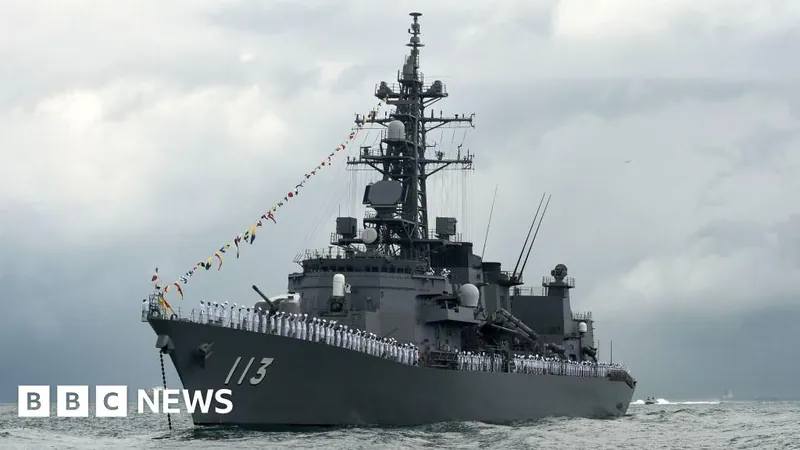
Japan Makes Waves: First Warship Transit Through Taiwan Strait in Decades!
2024-09-26
Japan Enters the Taiwan Strait
In a groundbreaking move, Japan has officially entered the political fray in one of the world's most contested waterways. Reports from Japanese media confirm that the Japanese destroyer, JS Sazanami, navigated the Taiwan Strait for the very first time on Wednesday, marking a historic moment for the nation as it aims to enhance its naval presence in the region.
Military Maneuvers with Allies
Navigating the strait between Taiwan and China, the Sazanami was not alone. It was joined by ships from Australia and New Zealand, all of which have converged to partake in upcoming military maneuvers in the South China Sea. This trip represents a monumental shift for Japan, which has long refrained from sending its naval vessels through the strait to avoid provoking Beijing, a country that asserts its sovereignty over the self-governing Taiwan as well as the strait itself.
Chinese Monitoring and Regional Tensions
While there has been no official word from Japan, Taiwan, or China regarding the passage, the Chinese state-run Global Times reported that the Chinese military monitored the JS Sazanami throughout its journey, claiming the situation was 'under control.' This highlights the enduring tension in the region, as the strait has become a significant flashpoint for military activity and geopolitical posturing.
The Importance of the Taiwan Strait
The Taiwan Strait, measuring approximately 180 km (112 miles), plays a pivotal role in global shipping, with nearly half of the world’s container ships passing through it. Both the US and Taiwan stress that these waters are international territory accessible to all naval vessels, a point that China vehemently contests.
Historical Context of Naval Transits
Historically, only the US Pacific fleet has routinely transited the strait, but in recent years, nations like Canada, Australia, the UK, and France have joined in. Just two weeks ago, Germany made waves of its own by sailing two navy ships through the strait for the first time in over two decades. Despite an angry response from Beijing, Germany defended its actions, stating that they were consistent with international maritime standards.
Japan’s Policy Shift
Japan's involvement signals a significant departure from its longstanding policy of avoiding direct confrontations with China. The country's Chief Cabinet Secretary acknowledged a growing sense of crisis, referencing multiple incursions by Chinese military aircraft into Japan's airspace—an assertion that Taiwan's Ministry of Defense echoed by reporting increased Chinese military activities near the island.
Global Concerns About China's Maritime Actions
Experts believe Japan's transit is indicative of broader global concerns regarding China's maritime assertiveness. According to Bec Strating, an international relations scholar at La Trobe University, this move is just part of an evolving strategy among nations that are wary of China's expansionist tactics, particularly in so-called 'grey zone' operations designed to undermine adversaries over time.
Chinese Military Developments
Chinese maneuvers in the region are intensifying; just last week, Beijing deployed an aircraft carrier between Japanese islands adjacent to Taiwan. Earlier in August, tensions flared when a Chinese spy plane crossed into Japanese airspace, prompting Tokyo to label the incident as a serious violation of its sovereignty.
Unified Response from Quad Nations
In a united front against perceived threats from Beijing, leaders of the Quad nations—Japan, Australia, India, and the US—recently announced plans to bolster maritime security collaboration. This alliance promises to counteract China's increasing assertiveness in the South China Sea, potentially reshaping the security dynamics in the Asia-Pacific region.
Conclusion
As global attention turns to these developments, the implications of Japan’s significant naval actions could redefine geopolitical alliances and naval strategies in the years to come!

 Brasil (PT)
Brasil (PT)
 Canada (EN)
Canada (EN)
 Chile (ES)
Chile (ES)
 España (ES)
España (ES)
 France (FR)
France (FR)
 Hong Kong (EN)
Hong Kong (EN)
 Italia (IT)
Italia (IT)
 日本 (JA)
日本 (JA)
 Magyarország (HU)
Magyarország (HU)
 Norge (NO)
Norge (NO)
 Polska (PL)
Polska (PL)
 Schweiz (DE)
Schweiz (DE)
 Singapore (EN)
Singapore (EN)
 Sverige (SV)
Sverige (SV)
 Suomi (FI)
Suomi (FI)
 Türkiye (TR)
Türkiye (TR)